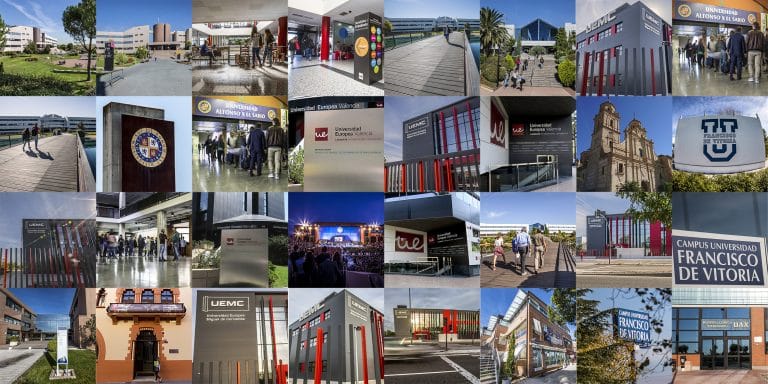FEEDUC explains everything you need to know about university admissions in Spain.
Going to study in Spain is a project that must be anticipated, prepared and above all, not rushed.
Check out the podcast!
Discover this article in video!
Universities in Spain, how does it work?
In Spain, 2 university systems coexist:
What do they have in common?
They are both under the authority of the Spanish State and controlled by it, therefore the official degrees obtained in a public university and those obtained in a private university are identical.
What are the differences?
The first is funding, although public universities are not free, they are largely funded by taxes paid by Spanish taxpayers while private universities are funded by the students enrolled in them.
The second difference is in the terms of access and timelines, which are very different for the public and private systems.

- Each private university has its own admission process and schedule, which is usually for one year only. It is not easy to navigate. Most universities will evaluate your Spanish level on their own, even if you have an official certification. Then, your high school grades may be taken into account by some (sometimes your 11th grade grades, sometimes your 12th grade grades, sometimes both), others may require you to take specific tests (psycho-technical or science tests, for example, in the case of health programs), sometimes you will have interviews, sometimes not, sometimes you will have to provide a cover letter, sometimes not, sometimes you will have to send a letter of recommendation, sometimes not, etc...
- You can apply to private universities in Spain even if you don't yet have your Bac results. As with Parcoursup, you will be admitted "subject to" obtaining your Bac. Some universities open their admissions processes from November/December onwards, and most are only really ready to process applications from January/February onwards, so there's no rush to send in your application as soon as admissions open. As a reminder, if you are registered with FEEDUC, your only commitment to us is to MUST send your application file to the universities we have selected, through our intermediary. This enables us to keep track of your file with the universities, which in turn allow you to benefit from our services in applying to them. On the FEEDUC website you'll find :
- The files to be filled in
- The list of documents to be provided
- Criteria for evaluating your file
- Advice
- And all the useful and necessary information on the details of the processes in the admission part of the page of the concerned university.
READ CAREFULLY: everything is indicated.
- When you apply, once FEEDUC has received your application, it is processed very quickly, usually within 24 hours, and you can be given access to the tests almost immediately. SENDING IN AN APPLICATION MEANS YOU'RE READY TO TAKE THE ADMISSION TESTS. Submitting a file without taking the tests gives you no priority and may just result in your file being lost by the university. It's the fact of taking the tests that triggers the procedure. At most universities, you can't take the tests again. If you take them too early and fail because you're not ready, you won't be able to take them again! Private universities are selective. If you don't meet the prerequisites, you won't be accepted, even if you're the first to apply. Of course, if you have all the prerequisites for the university you're interested in, then you can apply as soon as you like and be admitted.
- Once you have completed the tests, you may receive a positive response within 24 to 48 hours. This means that the university will require you to PAY THE BOOKING FEE IMMEDIATELY. And if you don't end up going to that university, you will not get your money back. They can be several hundred or even several thousand euros.
So, when you begin the process of applying to a private university in Spain, be prepared to take the tests immediately AND incur expenses that can be significant if you are admitted.
- Keep an eye on your e-mail, your spam, your Gmail promotion e-mails, etc. Too many students don't check their e-mail. The universities and FEEDUC communicate with you by e-mail, and every year candidates miss out on a place that could have been awarded to them just because they weren't serious about managing their mailbox. So be careful not to enter the wrong e-mail address when filling in your application! It happens more often than you think.
The public university in Spain is SELECTIVE, even very selective for some courses. Admissions are based on the "nota de corte" principle, which is the grade of the last person admitted in a given year, in a given program at a given university.
This "nota de corte" (out of 14 points) is often higher than 10 and is therefore, in these cases, mathematically unattainable by French students whose 20-point baccalaureate grade is reduced to a 10-point grade and would therefore be + or - 10/14 if they had a 20/20 baccalaureate.
In addition, an official certificate (SIELE or DELE) of level B2 is most of the time required in the application documents.
Finally, to apply for public schools, you must provide your official transcript of marks from your baccalaureate during the month of June. This is the only document accepted to officially attest that a candidate has obtained it.
This transcript of marks from the baccalaureate is only given at the beginning of July in France and this is often too late in relation to the admission schedules of public universities in Spain.
You now understand a little better why the vast majority of French students study in the private system.
You'll find all the detailed information (nota de corte, process, bachibac, PCEs, reconocimiento, etc...) about public universities in Spain in the video on this page of the FEEDUC website. Viewing is free.
You will also find on this same page of the site, this information in writing with a set of questions and answers.
Finally, this page describes the specific services offered by FEEDUC to students who have already obtained their baccalaureate and are registered with FEEDUC, in order to provide individual support to students who have already obtained their baccalaureate and would like to evaluate this possibility. This is a matter to be discussed with us individually during the interview you will have with a member of our team, following your registration on our site or later by e-mail.
What documents do I need to apply to a university in Spain?

There are really two documents required by both public and private universities in Spain:
- Valid identity document (passport or identity card)
- La Credencial
This Credencial is your legal access to university in Spain. It is the famous RLA (Requisito Legal de Acceso) that many universities tell you about.
In the vast majority of cases, your legal access to university is the baccalaureate, even for students who have already completed one or more years of higher education.
In order to obtain the Credencial , you will need your high school grades and your high school transcript.
The selection in private universities is not based on the Credencial score, unlike public universities. For this reason, you will need to send in your grades from yourfirst and/or last year of high school.
The list of documents required for private universities is very varied and changes from one university to another. For this reason, we have provided you with an admission process that details all the documents required for each course.
Finally, don't forget the importance of obtaining an official Spanish certificate (SIELE or DELE preferred), especially for public universities.
In summary, when should I apply to a university in Spain?
At a public university, admissions are done over a short period of time (about a month) in June.
In private universities, you can apply to some institutions as early as November but they are often not ready until January/February. The important thing to remember is that you should only apply when you have the prerequisites required by the university.
No (except for rare exceptions to the often poor quality of private training), admissions to public or private universities in Spain are not on afirst come,first served basis! A person who does not have the prerequisites can apply first, but will not be eligible.
Certainly, some programs fill up quickly in some universities, but there are often alternatives to study the program you are interested in at other universities offering similar quality.
To give you an idea of how long it takes, in the more than 10 years that FEEDUC has been in existence, there are still places available in the vast majority of courses, even in dentistry and veterinary medicine, at the end of June and even in July.
Obviously, waiting until so late is not necessarily recommended, but what you need to understand is that there is no urgency to apply in November or December, when some admission processes in Spain open.
You should apply in Spain when you are ready to take the tests and to pay for a possible place reservation.
What is the timeline for a study abroad project in Spain?
September to December: preparation of the project, selection of the most suitable universities and intense work in Spanish to obtain the required level.
January to June: Setting up the admission process and starting the administrative procedures
July to September: Final registration and finalization of administrative procedures for the start of the school year.
We can't stress this enough. FEEDUC's aim is to help you succeed in your studies, not to get you admitted to Spain. All our advice is designed to help you do just that.
Studying in Spain is just the first step on a long road to your chosen profession.
By following our advice, getting into a program in Spain, especially in a private university, is not impossible. It will just require a little method, determination and preparation for which you can count on our expertise. But unlike France and its competitive examination system where getting in is the most difficult, in Spain you have everything to do and prove once you start your training .
Were you able to enter a university program in Spain with a B1 level of Spanish? Yes. Is that enough to understand everything and pass your subjects? No, probably not.
Is it compulsory to choose an SVT speciality when studying dentistry in Spain? No. Will I do better in my studies if I take this specialty? Yes, without a doubt!
Does studying in French or English allow me to graduate with the same degree as my classmates who study in Spanish? Yes. Will I have the same skills? Students who study in Spanish have a great advantage in internships and are much more comfortable with patients, and professionals give them much more responsibility and ultimately acquire more skills than their peers who have a much lower level of Spanish due to the fact that they studied in another language.

In summary:
The accompaniment of several thousand students over the last 10 years gives us the necessary hindsight to advise you in the best possible way.
FOR ALL THOSE WHO HAVE A PLAN TO STUDY IN SPAIN NEXT YEAR, WHAT TO DO?
Contact us as soon as possible and let's start working together on your project!
The sooner you have access to information, the longer you will have to prepare yourself and the better prepared you will be to succeed in your studies in Spain !
It is never too early to have time to prepare for admission, especially by doing a gap year.
It's also in the preparation that FEEDUC brings you its real added value.
What about September? Later will be too late.... Register as soon as possible on the FEEDUC website to start receiving support and access to the best individual advice for your study project in Spain.
It's our presence in the field that makes FEEDUC: we know what we're talking about, and we only talk about what we know.
IF YOU HAVE ANY QUESTIONS, PLEASE CONTACT THE FEEDUC TEAM:
We hope you've found it useful, and please feel free to share it if you think it might be of use to others?
E-Mail: info@feeduc.eu
Facebook: Francespagne.Education / Twitter: @francespagne
Instagram: @francespagne_education and @etudier.en.espagne
LinkedIn : FEEDUC
You Tube (more than 100 videos!) : HERE
See you soon!
Opportunities and preparation for your studies in Spain? FEEDUC of course!



